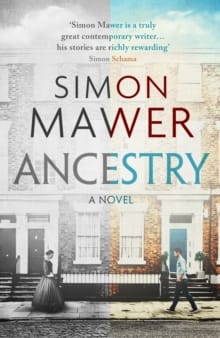
“Ancestry” by Simon Mawer
This is a fictionalised account of some of the author’s ancestors, hence the title, being based on his genealogical researc. Simon Mawer’s family has an interesting history which in the hands of a very competent experienced author produces an intriguing and unusual read. As you turn the pages, you know there is a lot of fact behind the fiction, but the interest is because it is fiction and the merging of two branches of his family tree into one book makes a good story.
The book begins on a Suffolk beach in 1837 with the discovery of a body by Abraham Block and his brother, Isaac. Abraham pockets two gold sovereigns which later help him escape the restrictions of his home village fulfilling his wish by running off to sea where he becomes an experienced seaman; samples life, foreign parts and the mysteries of London, where he returns to when he can having family living there.
Naomi Lulham, a seamstress, leaves Hastings to try and make her way in London. The plan is to live with her elder sister Mary, but a meeting on the train leads to an affair and she finds herself expecting a baby. She ends up lodging with Abraham’s uncle, close by the docks, establishes herself with her craft, which, along with their fictional life story, provides the next part of the author’s family tree. Abraham and Naomi become a couple, though a seaman’s life leads to long periods away, but their home life is a happy one.
The second part of the family tree introduces the reader to George Mawer, a soldier in the 50th Regiment of Foot. In 1847 at Manchester Cathedral he marries his Irish-born wife Ann Scanlon.
We follow the couple, and their growing family around various barracks and garrisons as his postings lead them from town to town. The Crimean War takes George, now a Corporal, off to a war which Simon Mawer features strongly in this part of the book with in depth descriptions of engagements and embattlements within the peninsular. In particular the siege of Sevastapol.
Ann is left to fend for herself and her children; there was no support for army wives of fighting troops. As George has roots in Lincolnshire she opts to head there rather than back to Ireland.
She gradually establishes herself in Lincoln city living a very hard life, but with the support of the local priest and aided by parish charity. However, her two eldest children are sent to schools in London where at least they are cared for and educated, though separated and away from their mother. It is a tortuous existence that the author depicts for Ann Mawer. Her life story is the core of this section as the author links up his genealogical routes.
This is an unusual novel well told. The sections within Crimea authenticated by the historical records Mawer refers to, as he does interestingly elsewhere throughout the book. It is an original way to source the theme for a work of historical fiction; he succeeds. Anyone interested in 19th century British social history will enjoy this book; Simon Mawer’s loyal followers will not be disappointed.
